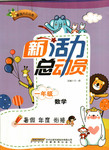
 新活力总动员暑系列答案
新活力总动员暑系列答案 龙人图书快乐假期暑假作业郑州大学出版社系列答案
龙人图书快乐假期暑假作业郑州大学出版社系列答案科目:高中英语 来源:不详 题型:阅读理解
查看答案和解析>>
科目:高中英语 来源:不详 题型:完形填空
查看答案和解析>>
科目:高中英语 来源:不详 题型:完形填空
查看答案和解析>>
科目:高中英语 来源:不详 题型:阅读理解
 d into science(理科) and liberal
d into science(理科) and liberal  arts(文科)classes in high school, a practice that allows them to stay competitive in college entrance exam by choosing preferred subjects. The debate came after the Ministry of Education began to ask for opinions from the public on Friday on whether it was necessary and possible to stop the dividing system, which has been accepted for decades.
arts(文科)classes in high school, a practice that allows them to stay competitive in college entrance exam by choosing preferred subjects. The debate came after the Ministry of Education began to ask for opinions from the public on Friday on whether it was necessary and possible to stop the dividing system, which has been accepted for decades.  abolishment (废除)and 40 percent against.
abolishment (废除)and 40 percent against.  vision? We have to study nine subjects? Finally we will study everything and have learnt little,” wrote another netizen.
vision? We have to study nine subjects? Finally we will study everything and have learnt little,” wrote another netizen.  science subjects after ten years’ education, which include six years in primary school, three years i
science subjects after ten years’ education, which include six years in primary school, three years i n junior high school and one year in senior high school.
n junior high school and one year in senior high school. | A.have more chance to look for jobs in future |
| B.find a good job after graduation |
| C.have more advantages to enter a university |
| D.show interest in daily life |
| A.is for the abolishment | B.is against the abolishment |
| C.doesn’t care the abolishment | D.prefers students to learn more |
| A.The debate is on whether the students should choose science or liberal arts classes in high school |
| B.More people on the Internet are for the abolishment |
| C.The students who are against the abolishment think abolishing the current system of division will heavy their burden. |
| D.Science students are required to take physics, biology and chemistry besides |
| A.Chinese, math and English. | B.Physics, biology and chemistry. |
| C.Politics, history and geography. | D.Both B and C |
查看答案和解析>>
科目:高中英语 来源:不详 题型:阅读理解
查看答案和解析>>
科目:高中英语 来源:不详 题型:阅读理解
查看答案和解析>>
科目:高中英语 来源:不详 题型:阅读理解
查看答案和解析>>
科目:高中英语 来源:不详 题型:阅读理解
查看答案和解析>>
湖北省互联网违法和不良信息举报平台 | 网上有害信息举报专区 | 电信诈骗举报专区 | 涉历史虚无主义有害信息举报专区 | 涉企侵权举报专区
违法和不良信息举报电话:027-86699610 举报邮箱:58377363@163.com